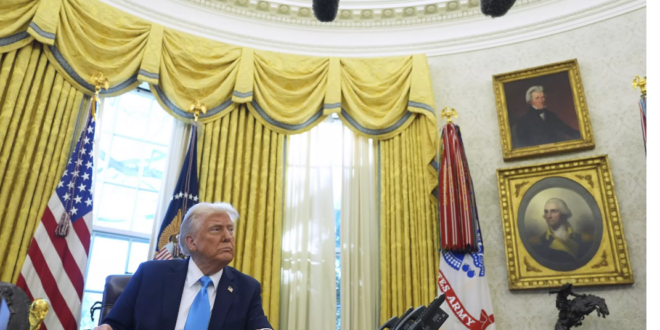Muhamad Yehia
Trump’s tariffs could derail Europe’s 2025 growth, say top Wall Street analysts. Goldman Sachs sees eurozone GDP at 0.7%, well below latest ECB projections. Key sectors such as cars and pharmaceuticals face risks, while a weaker euro may offer only limited relief.
A fresh wave of trade uncertainty could hit Europe’s already sluggish economy, as leading US investment banks raise concerns over potential tariffs from President Donald Trump’s administration.
With euro area growth forecasts slipping and corporate profits under pressure, analysts believe markets should brace for an uncertain 2025
Economists at Goldman Sachs and JPMorgan indicated in various reports this week that the risk of tariffs – combined with potential European retaliation – could significantly weigh on the eurozone’s economic outlook.
While the European Union was not included in the first round of US tariffs, which affected Mexico, Canada and China, President Donald Trump has suggested that the bloc, given its large trade surplus with the US, could be next
?How much damage could tariffs cause
Goldman Sachs forecasts eurozone gross domestic product growth at 0.7% in 2025, notably below the 1% consensus estimate and the 1.1 projection from the European Central Bank in December.
According to Sven Jari Stehn, chief European economist at Goldman Sachs, a 10% tariff on all US imports from the EU – if met with full retaliation – could wipe out one percentage point of euro area growth.
Beyond GDP, European corporate earnings could also come under pressure. Goldman Sachs’ equity team projects European earnings per share growth at just 3% in 2025, well below the 8% bottom-up consensus.
“It is not necessarily the tariffs themselves that matter,” said the team, “but rather the trade uncertainty that hits economic growth and investment intentions.”
?Which sectors are most at risk
The EU accounts for approximately 15% of total US imports, with machinery, pharmaceuticals, and chemicals among the top European exports to the US. Other key industries, including cars, metals, and technology, could also face significant tariff exposure.
Goldman Sachs’ analysts note that stock market sectors with high margins and defensive characteristics, such as healthcare, tend to be less affected by trade uncertainty. In contrast, car manufacturers and cyclical stocks are particularly vulnerable.
A group of large-cap European stocks, often referred to as “GRANOLAS” – which includes companies such as GSK, Roche, ASML, Nestlé, Novartis, Novo Nordisk, L’Oréal, LVMH, AstraZeneca, SAP, and Sanofi – have underperformed recently but tend to outperform when trade policy uncertainty rises.
?Can a weaker euro cushion the impact
A declining euro could provide some relief for European stocks, particularly for multinational firms with significant global revenue exposure. Goldman Sachs’ foreign exchange strategists expect the EUR/USD exchange rate to fall to 0.97 over the next 12 months, while GBP/USD could weaken to 1.20.
However, the link between a weaker euro and European equities is complex.
Historically, a strong US dollar has correlated with the underperformance of non-US markets, as dollar-based investors in European stocks see diminished returns unless they hedge against currency fluctuations.
“Euro weakening normally comes alongside a rise in the risk premium, which offsets translation and competitiveness advantages,” said the analysts.
?Europe’s retaliation strategy: what’s next
Uncertainty also surrounds how the EU might respond to new US tariffs.
According to JPMorgan economist Nora Szentivanyi, “the motivation, objectives, timing, and tariff rates are all unclear.” However, the European Commission has stated that it would retaliate ‘firmly’ against any US-imposed tariffs.
If the EU follows its 2018 strategy of targeted retaliation, it is likely to avoid tariffs on energy products but could impose steep duties – potentially exceeding 50% – on goods that impact Trump’s voter base the most.
JPMorgan already factors in a 0.5 percentage-point annualised growth drag over the next four quarters due to heightened trade policy uncertainty. Yet, Szentivanyi notes that new tariff threats – combined with weak euro area growth – could further weigh on the region’s economic outlook.
On Tuesday, US Treasury Secretary Scott Bessent met with ECB President Christine Lagarde to discuss economic priorities and transatlantic cooperation.
While no specific details were disclosed, the meeting underscores the increasing focus on US-EU trade tensions as financial markets await further clarity on Washington’s trade policy stance.
 موقع وجه أفريقيا موقع وجه أفريقيا هو موقع مهتم بمتابعة التطورات في القارة الأفريقية
موقع وجه أفريقيا موقع وجه أفريقيا هو موقع مهتم بمتابعة التطورات في القارة الأفريقية



